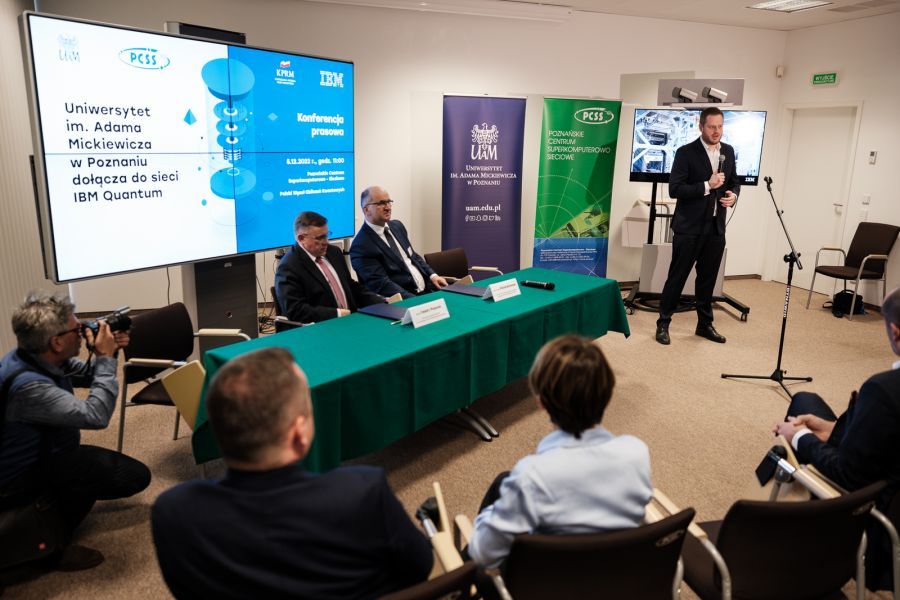In February 2022, as the first institution in Central Europe, the Poznan Supercomputing and Networking Centre (PSNC), affiliated with the Institute of Bioorganic Chemistry of the Polish Academy of Sciences, joined the IBM Quantum Network. Now, by signing a membership agreement with PSNC, which is the operator of the Polish IBM Quantum Network Hub, Adam Mickiewicz University in Poznan joins the IBM Quantum Network as well.
Our assumption from the beginning of the project has been to strengthen national competence in quantum computing and to support the development of applications of this innovative technology. As part of the funding to date, access has been provided to IBM's physical quantum computers, on which computational experiments in various areas of scientific challenges have been launched,' states Minister Janusz Cieszyński, Secretary of State in the Chancellery of the Prime Minister.
The Adam Mickiewicz University in Poznan has already received a positive opinion from IBM regarding the scope of its R&D work and ongoing quantum computing projects. This was preceded by a period of experiments, conducted in collaboration with PSNC, thanks to funding from the Chancellery of the Prime Minister, which, in addition to access to the largest quantum computer, also included preparation and substantive support for the teams.
The aim of the experiments conducted by the UAM teams under the direction of Karol Bartkiewicz, UAM professor, is to identify areas of application for quantum computers. Three main groups can be distinguished, i.e., quantum simulators (physics and chemistry), artificial intelligence and optimization. All these groups are essential for the development of science and the economy. Areas of basic and applied research in which quantum computers are seen to have applications include, for example, new materials - batteries, defect detection, semiconductor materials, prediction of chemical properties, new drug discovery, and chemical product design. There are also challenges in new catalysts, optimization of chemical processes, classification in high energy physics, classification of financial transactions, product recommendation, and fraud detection. 'I am most interested in the possibility of modelling complex quantum open systems, which could lead, for example, to new sensors with improved accuracy,' explains Prof Bartkiewicz.
Another fundamental application that gives an advantage in running quantum machine learning algorithms is their ability to learn concepts of a quantum nature, which is in practice unattainable for classical machines. Using access to quantum computers, experiments with generative models of quantum states QGAN (Quantum Generative Adversarial Network) and SQGEN (Synergic Quantum Generative Network) were conducted by a team from Adam Mickiewicz University.
The Poznan Supercomputing and Networking Centre's receipt of a state-of-the-art quantum hub, the first of its kind in Central and Eastern Europe, and its inclusion in IBM's elite group has also benefited Poznan's scientific community. Proof of this is the agreement signed today and Adam Mickiewicz University joining the IMB Quantum Network. I was already convinced of this in February this year when the PSNC gained access to the computing power of a quantum computer. Technologies will not develop without cooperation between units, so it is extremely gratifying for the UAM to join the project. At a time of considerable risk of cybercrime, cooperation and high investment in research and development in this area are essential,' stresses Jadwiga Emilewicz.
Other Polish scientific institutions are also showing interest in joining the IBM Quantum network and using quantum computers. New quantum algorithms in combinatorial optimization and their applications in problems of task serialization are being developed, as well as quantum algorithms in logistics and storage problems," announces Krzysztof Kurowski, PhD, from PSNC.
Read more about IBM Quantum Network Hub and Poznan Supercomputing and Network Center.
Photo credit: Adrian Wykrota






